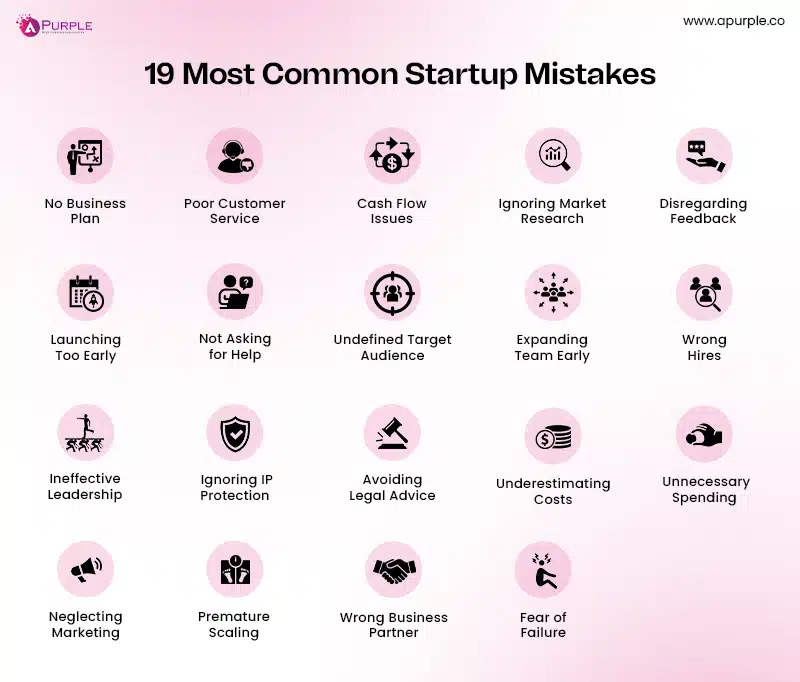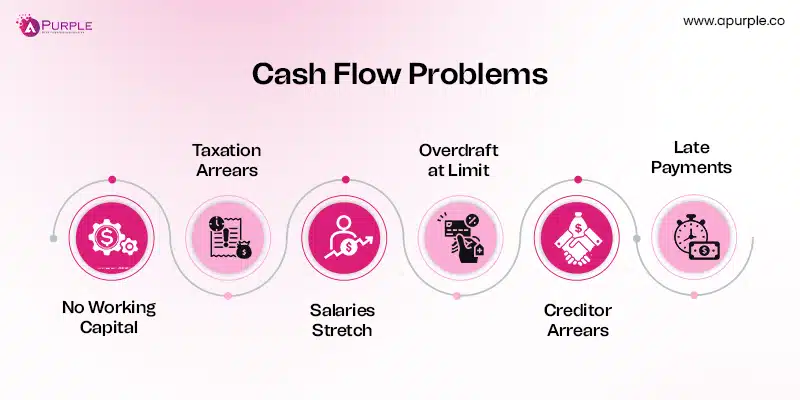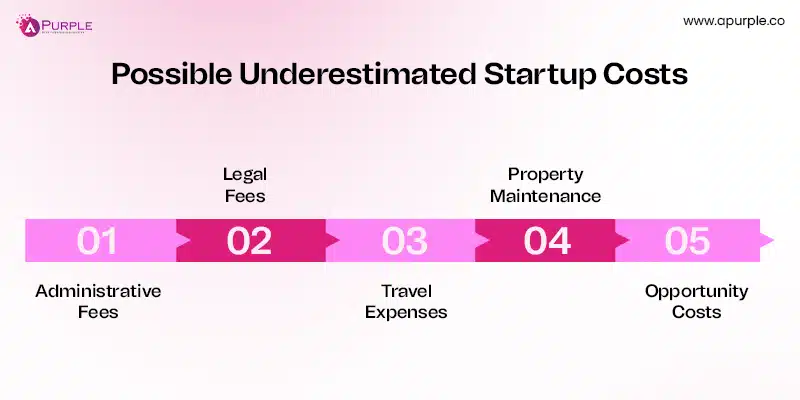Why do you need to read this?
Everyone learns from their mistakes, but you don’t have to be the one making them and learning from them. Especially if you’re a startup owner who’s often running on a tight budget and cannot afford blunders, you can learn from the mistakes made by other startups and prevent yours from repeating the same. This blog will help you understand startup mistakes that many entrepreneurs commonly make at the beginning of their business journey so you can educate yourself on what to do and what not to do.
Starting a business is an exciting yet challenging journey, every entrepreneur is motivated and wants to establish their mark. However, avoiding common startup mistakes before they happen can make a significant difference between success and failure.
90% of startups fail because of the mistakes they either overlooked, ignored, or didn’t know how to address. And let’s just admit it: business mistakes are tough to avoid. But it’s doable. The key is to understand them early and prevent them with corrective actions.
With that in mind, waiting until it’s too late to uncover rookie startup mistakes and their solid solutions to embark on a successful entrepreneurial journey is not okay.
With the help of our team at aPurple, who have over 11 years of experience helping startups launch their businesses with world-class app development and know the nitty-gritty of the startup world, we have compiled a list of 19 common startup mistakes. These are the ones that entrepreneurs often overlook or are unaware of, which can cost them big time later. Read them, along with their solutions, so you can avoid making these mistakes.
Start Reading!!!
19 Common Startup Mistakes to Avoid
We want your business not only to survive but thrive. Check these 19 common startup mistakes to avoid when starting a company:
- 1. No Business Plan
- 2. Poor Customer Service
- 3. Poor Cash flow
- 4. Ignoring Market Research
- 5. Disregarding Customer Feedback
- 6. Launching Too Early
- 7. Not Asking for Help
- 8. Not Defining Your Target Audience
- 9. Premature Scaling
- 10. Hiring the Wrong People
- 11. Ineffective Leadership
- 12. Failure to Secure Intellectual Property
- 13. Not Seeking Legal Advice
- 14. Underestimating Costs
- 15. Overspending and Unnecessary Spending
- 16. Neglecting Marketing Strategy
- 17. Expanding Too Early
- 18. Choosing the Wrong Business Partner
- 19. Fear of Failure
1) No Business Plan
It is not just a business; starting anything without proper preparation or a plan may harm your work. Starting a business without a plan can distract you from your long-term goal. While business plan mistakes can be fixed, the real danger lies in having no plan at all – without direction, even the best ideas can lose their way.
A solid business plan is the foundation of every successful startup. However, many entrepreneurs think they can “figure it out when it comes.” It refers to poor entrepreneurial practice and can lead to confusion and a lack of direction. A good business plan helps you define your mission and vision for your unique business idea.
Always make your business plan with S-M-A-R-T factors:
- Specific
- Measurable
- Achievable
- Relevant
- Time-based
Startups can create business plans using tools like LivePlan, Bizplan, PlanGuru, or Enloop. These tools offer templates, financial forecasting, and easy collaboration. For team collaboration, Trello or Google Workspace (Docs, Sheets, Slides) are great for organizing and sharing ideas.
Alternatively, working with startup consultants like aPurple can provide tailored strategies, investor-ready plans, and expert financial projections, ensuring your business plan is practical and compelling.
Pro Tip: Don’t hurry. Take enough time to research, outline your business goals, and create a proper business plan. Set clear short-term milestones & put efforts into achieving them. Update & adjust the plan quarterly according to real-world feedback & circumstances, but never miss this step.
2) Poor Customer Service
Prioritizing customer service should be a key point on your starting a business checklist, as it directly impacts customer retention and brand loyalty. In the rush of taking business to the top position, many startups lack quality customer service.
However, customer satisfaction is key to customer retention, brand loyalty, and positive word-of-mouth marketing. This is super important for startup owners to understand. Poor customer service and experience can lead to negative reviews and a tarnished brand reputation. So, if you want to take off and not crash, listen to your customers and work on them.
Global brands like Amazon, Zappos, and Zomato have built their success on exceptional customer service. They offer fast shipping, personalized support, and seamless user experiences. Their commitment to customer satisfaction has helped them build a loyal customer base, driving long-term growth and brand loyalty.
Pro Tip: Hire people who value your business and can honestly help your customers. Invest in a team or system (Self Service Portal OR Chatbot) that is continuously responsive, attentive, and dedicated to promptly resolving issues.
3) Poor Cash flow
One of the most common mistakes new business owners make is failing to manage their cash flow properly. Startups mostly miscalculate or underestimate the cost of running a successful business and can quickly deplete their funds if they don’t budget properly.
This could be the possible cash flow problems for startups:
Pro Tip: Keep your eyes on cash flow and always have emergency funds for unexpected situations. Accounting software (Zoho Books, Xero, NetSuite, etc.) can help you track your finances regularly and generate regular reports.
4) Ignoring Market Research
One of the biggest startup mistakes is skipping comprehensive market research. Without knowing your market’s needs, current competition, and audience preferences, your business idea may fail rapidly, leading to startup failure.
Watch this video to discover why 90% of startups fail:
Perfect market research helps you understand user behavior and refine or modify your product and offerings. How to Conduct Market Research Effectively:
- Surveys and Questionnaires: Using platforms like Google Forms or SurveyMonkey (free version) to gather direct feedback from their target audience.
- Social Media Listening: Tools like Hootsuite or BuzzSumo (free versions) help track online conversations and trends in real time, giving startups insights into customer preferences and competitor strategies.
- Competitor Analysis: Using tools like SimilarWeb (free version) or Ubersuggest, startups can analyze competitors’ websites, traffic sources, and marketing strategies to identify gaps and opportunities in the market.
- Customer Interviews: Conducting one-on-one interviews with potential customers in person or via video calls is a great way to get qualitative insights into their needs and pain points.
Pro Tip: Invest your time and valuable resources in understanding your specific industry and target market. Regularly gather feedback from your clients and competitors to adjust productive business strategies.
5) Disregarding Customer Feedback
Startups are mainly oriented on what to do and how to do it quickly to reach more customers. In the process, they ignore customer feedback, which becomes the most significant business mistake for any new entrepreneur.
However, customer feedback leads businesses to understand what their client thinks and what is best for them from your company. With this, you can improvise your products and services.
Startup owners can track customer feedback through channels like email, social media, and customer support tickets. Tools like Zendesk, Trello, or HubSpot CRM (free versions available) can help organize, prioritize, and analyze feedback to identify patterns and improve customer experience.
Pro Tip: Don’t ignore your clients’ reviews or feedback; make them a part of your marketing strategy. After gathering feedback, take immediate action and resolve them ASAP.
6) Launching Too Early
Early launch, early failure! Some entrepreneurs are eager to launch their products before testing them properly. A premature launch can result in bugs, flaws, or unmet market requirements that can easily harm a newly launched business.
Pro Tip: Work on Proof of Concept, prototype, or MVP development before going live. Without doing and hurrying, test your product thoroughly, go through beta testing, and get real-world user feedback and reviews to ensure it’s ready for the official launch.
7) Not Asking for Help
Entrepreneurs are incredibly excited about their businesses, and they always try to do everything on their own. However, ignoring expert advice and not asking for help is one of the biggest startup mistakes that can waste your time and resources.
Instead, seek guidance from expert startup consultants like aPurple. They have experience helping businesses navigate challenges, refine strategies, and avoid costly missteps. Their insights can help accelerate growth and set you on the right path from day one.
Pro Tip: Don’t let your ego spoil your dream business, and don’t be afraid to seek help from industry experts in areas such as legal, finance, and marketing. Strong support can build success-proof startups, so arm yourself with a strong support network.
8) Not Defining Your Target Audience
Failing to understand and clearly define your target market is a standard business mistake for startups. Without a clear focus and understanding of your target market, you risk wasting resources on marketing to a false audience, which can lead to missing your business goals and product success.
However, having a proper idea about the target audience can help you to build worthwhile marketing strategies and several new customers. Use tools like Google Analytics to understand website traffic, BuzzSumo or Hootsuite to track social media trends, or SurveyMonkey and Typeform to gather customer feedback directly.
For a more refined approach, consider working with experienced consultants like aPurple, who can guide you in shaping your business strategy based on real data, ensuring you focus on the right target audience.
Want to know where your target audience relies? See this:
Pro Tip: Precisely work on factors like Demographics, Psychographics, Behaviors, and Geographic location to define the target audience. Take advantage of tools and social media.
9) Expanding Team Early
Expanding a team early is one of the startup mistakes many new business entrepreneurs make. Many business owners want to increase the number of employees too quickly to establish their business as a brand. However, expanding rapidly without solidifying the core business model is a dumb idea.
Many startups experience resource drain and operational inefficiencies due to early expansion. These mistakes can also cause financial losses, so waiting fruitfully instead of hurrying is never bad.
Pro Tip: Before expanding the startup, invest your time to build a strong customer base and a sustainable business model. As demand grows, expand accordingly.
10) Hiring the Wrong People
Hiring the wrong core team could be one of the most costly startup mistakes that can cause significant disruptions. Your newly launched startup has to suffer from poor work quality, missed deadlines, and toxic work culture because of wrong hiring.
Doesn’t matter if you belong to a non-tech or fully IT-oriented startup. If you don’t focus on how to hire developers for a startup or how to hire a customer-support team for your business, then the chances of startup failure can increase rapidly.
Pro Tip: Don’t hurry when you are paying someone. Hire employees who align with your business’s mission, vision, and values. Properly invest in employee training and mentorship to ensure a successful team dynamic.
11) Ineffective Leadership
As a startup founder, your leadership style sets the tone for your team. Ineffective leadership can lead to poor business health. It spreads low morale, miscommunication, and lousy decision-making among team members, ultimately harming the growth and success of your business.
Moreover, how you lead your team always matters. Your thoughts, visions, and leadership skills are the core ingredients for shaping your team for positive outcomes.
Pro Tip: Develop strong leadership skills by enhancing your communication skills, delegating tasks, and inspiring your team. If necessary, invest in leadership development programs.
12) Failure to Secure Intellectual Property
Another business mistake to avoid is failing to protect your intellectual property (IP). If you don’t protect your intellectual property, which means innovations, there are several chances of stealing business ideas from your competitors, which leads to losing competitive advantage.
Pro Tip: Consult an IP attorney to secure your business’s ideas, patents, trademarks, or copyrights. Protect your business assets ASAP. Always ensure partners, investors, or employees sign a Non-Disclosure Agreement (NDA). This legally binds them to confidentiality.
13) Not Seeking Legal Advice
This is the most common business mistake from entrepreneurs. They often skip taking legal advice on business registration, taxes, regulatory compliance, licensing and permits, contracts, privacy policy, foreign investments, etc. This mistake can lead to costly errors and missed opportunities.
Pro Tip: Get a consultation from legal professionals who can guide you and help you through tax laws, business contracts, and growth strategies. It’s not a waste of money. Pre-investment in legal advice can save money in the long run.
14) Underestimating Costs
Understanding the full cost remains a difficult task for many entrepreneurs. So many business owners make the mistake of underestimating the costs of running a successful business.
Whether related to product development or marketing, business expenses can quickly add up and drain assets if not correctly predicted.
To stay on top of your finances, use tools like QuickBooks or Xero for detailed budgeting, expense tracking, and financial forecasting. Wave is a great free alternative for basic accounting and expense management. Additionally, Mint can help you track cash flow and set financial goals.
Pro Tip: Don’t calculate expenses roughly. Create a detailed budget and track expenses carefully. Always have emergency or extra funds for unexpected losses and unforeseen difficulties.
15) Overspending and Unnecessary Spending
Because new businesses are new to the market, they are primarily stuck in the trap of overspending or wasting money on unnecessary resources or unworthy hirings.
Many startups also make mistakes with non-essential expenses, such as excessive office space or lavish marketing campaigns, that don’t generate positive results.
Pro Tip: Be thrifty at the beginning of your dream and prioritize spending on areas that help your business grow, such as marketing and product development. Tools like Expensify or QuickBooks can help monitor and categorize your expenses.
16) Neglecting Marketing Strategy
The most common startup mistake is not focusing on a clear marketing strategy. Even with a great product and service, building brand awareness and generating sales is tough without effective marketing.
There are many branding services providers and branding experts, but startups generally don’t consider consulting with them or hiring them. This ultimately leads to poor marketing, no sales, and a waste of money.
Pro Tip: Never get too obsessed with any marketing idea; Continually develop a comprehensive marketing strategy that includes content marketing, social media, and paid ads. Consistently track every strategy (use tools like Semrush or HubSpot) and its outcomes to improve and achieve worthy results for your marketing efforts.
17) Premature Business Scaling
Scaling quickly without establishing a core team or stable business model can present multiple challenges for entrepreneurs. It can cause logistical challenges, financial strain, and operational mistakes.
Pro Tip: Concentrate on creating an unbreakable and perfect business model before entering new markets or launching new products.
18) Choosing the Wrong Business Partner
Not only for startups but also for business partners are pillars of every business, so it is essential to choose your partner wisely. Choosing the wrong business partner can result in conflicts, disagreements, and even business failure. So make sure your business partner also shares the same mission, vision, and values as you.
A trusted partner, like aPurple, understands businesses’ challenges and offers the expertise to guide you toward success. With a shared commitment to your goals, we can ensure your business remains aligned and focused on achieving long-term growth.
Pro Tip: Never commit quickly to anybody. Take time with your partner to discuss and explain the business. Ensure that they agree with and are comfortable with your future goals, values, and work ethics before making a final commitment.
19) Fear of Failure
Everybody gets nervous when they are about to begin something new, and that’s natural. But sometimes, entrepreneurs let their nervousness and fear of failure weigh on them, which can become a grave startup mistake for new businesses.
Getting paralyzed by fear of failure can stop entrepreneurs from making bold decisions and taking necessary risks, which is not suitable for any business.
Pro Tip: Roy T. Bennett’s popular quote is, “The one who falls and gets up is stronger than the one who never tried. Do not fear failure, but rather fear not trying,” so embrace your failure as a learning experience. Take calculated and affordable risks, adapt, and keep moving forward.
The following section will explore some lesser-known but common small business mistakes, building on our exploration of the mistakes to avoid when starting a business. Keep reading!!
Lesser-Known Startup Mistakes to Correct at Early-Stage
If your goal is big and you want to be perfect at what you are doing, then don’t ignore these three lesser-known startup mistakes listed below:
- Over-reliance on One Revenue Stream
- Ignoring Legal Compliance Early On
- Neglecting to Build a Strong Company Culture
Over-reliance on One Revenue Stream
Relying on a single revenue stream can make your business limited, vulnerable, and non-scalable. Diversifying your business’ income source gives you early stability and prevention from quick startup failures. Multiple revenue sources can protect you from unpredictable market ups and downs.
Pro Tip: Always have diversified revenue streams for business from the beginning.
Ignoring Legal Compliance Early On
Not being serious about legal compliance can lead to fines or lawsuits. Getting stuck in a lawsuit can affect your business productivity and focus.
Addressing key legal aspects like registration, intellectual property, and taxes at the beginning of your startup can protect your business from costly legal issues and ensure long-term success.
Pro Tip: Prioritize legal compliance from day one to avoid costly fines and protect your startup’s reputation and future growth.
Neglecting to Build a Strong Company Culture Early On
As employees rely on a company, a company also depends on its employees. If you don’t make your employees happy or provide a healthy work culture, it will directly affect your business productivity.
Failure to establish a positive company culture early can lead to low employee morale, high turnover, and difficulties in talent acquisition.
Pro Tip: Do not delay this. Work to establish a positive, inclusive company culture to attract top talent and foster a loyal, motivated team.
Now, you know what startup mistakes could be and how to avoid them. As I told you earlier, this is the perfect guide for entrepreneurs who don’t want to be stuck in business mistakes. The following is a quick guide to understanding the latest startup trends.
What Are the Current Trends that Affects Startups
Here, check the top trends and make your startup part of it:
1. Digital Transformation and AI Integration
Undoubtedly, technology is the current trend and the future. According to the PitchBook Emerging Tech Indicator Survey, AI and ML experts have raised $2 billion across 42 deals, boosting these trends.
That means startups without a digital-first approach or those not comfortable with AI integrations are risking their businesses falling behind. Automation, personalized customer service, and data-driven decision-making are no longer optional.
Read also: AI Startup Ideas for Entrepreneurs
2. Web3, Blockchain, and Decentralized Applications
Not considering advancements in Web3 and blockchain might cause your startup to lack opportunities to innovate in multiple industries such as fintech, supply chain management, or creator economies.
3. Remote and Hybrid Work Models
Ignoring flexible work trends and not providing remote work may lead to talent acquisition challenges compared to your competitors. Most professionals prefer remote work and flexible timings. You must match this trend or compromise with a great team.
4. Augmented Reality (AR) and Virtual Reality (VR)
Augmented Reality (AR) and Virtual Reality (VR) are all about enhancing user experience to the next level. If your startup is not considering AR and VR, then you are risking the opportunity to provide an engaging, interactive, and innovative customer experience. Retail, education, healthcare, and entertainment are the rising sectors adopting this technology. If you don’t want to fall behind your competitors, you should embrace AR and VR.
Actionable Tips to Tackle Current Trends
- Stay informed with industry reports and market analyses.
- Embrace advanced tools and technologies regarding your startup.
- Build flexibility in company operations to adapt to unexpected changes at times.
- Engage with the target audience directly to understand their needs time by time.
How to Recover From Business Mistakes?
Mistakes are inevitable in business, but how you handle them determines your success. A well-thought-out recovery strategy can turn setbacks into valuable learning opportunities and create a path to success.
- Always acknowledge the mistakes and take responsibility for them.
- Analyze the root cause to prevent it from happening again.
- Collect feedback from your team and stakeholders for the right perspectives.
- Create a clear action plan to address the issue precisely.
- Establish transparent communication with customers and partners.
- Seek mentorship or expert advice for complex challenges. Companies like aPurple can assist you with tech startup business plans to stay updated with market trends.
- Emphasize focus on quick wins to rebuild trust and momentum.
- Prioritize financial stability by adjusting budgets and goals.
- Stay resilient and maintain a growth mindset to move forward.
Final Words
Starting a business is always an exciting journey but comes with uphill battles. By understanding and avoiding the common business mistakes mentioned above, you can build a strong foundation for your startup and increase your chances of long-term success.
The key is remembering, preparing, adapting, and learning from others’ experiences. While challenges are unavoidable, they can be stepping stones toward growth when met with resilience and strategic action. Take enough time to plan, execute thoughtfully, and evolve with the market trends to turn your entrepreneurial vision into reality.
With years of expertise, aPurple helps startups navigate common challenges with expert guidance and tailored solutions. Let us support you in avoiding costly mistakes and building a successful, scalable business from day one.
Happy Entrepreneurship!!!!
Frequently Asked Questions (FAQs)
Startups generally make several common business mistakes that can harm their growth. Four of the most typical mistakes include:
- Lack of Market Research
- Insufficient Capital
- No Business Plan
- Poor Financial Management
The possible reason for startup failure could be:
- Lack of Market Demand
- Cash Flow Issues
- Team Problems
- Competitive Pressure
- Inability to Pivot
To address business failure, the following steps can be helpful:
- Analyze what went wrong with market issues, cash flow problems, or internal team conflicts.
- Sometimes, the problem is that the original business idea isn’t viable. Be willing to pivot, change your product or service, or target a different market.
- If cash flow is a significant issue, review expenses, cut unnecessary costs, and improve operations efficiency.
- Surround yourself with mentors, advisors, or experienced entrepreneurs who can provide guidance and fresh perspectives.
- If funding is a significant issue, look for new investors, grants, or alternative financing options.
- Prioritize maintaining a healthy cash flow and seek financial advice or assistance to develop a sustainable economic plan.










